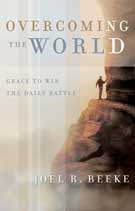 Joel Beeke is fast becoming one of my "go-to" guys when it comes to contemporary theology, and this book is a stellar example why I'm turning to him faster than "bigger named" Reformed writers. I'll start with my complaints and then move into the reasons I think any Christian who is not yet completely sanctified should read this book.
Joel Beeke is fast becoming one of my "go-to" guys when it comes to contemporary theology, and this book is a stellar example why I'm turning to him faster than "bigger named" Reformed writers. I'll start with my complaints and then move into the reasons I think any Christian who is not yet completely sanctified should read this book.
There are two drawbacks to this book. The first is that Part Four is addressed to Ministers. And that's fine, don't get me wrong. But it's not marketed that way, it's marketed for the general audience, not as an expansion on talks he did at a ministerial conference (so it makes sense that one talk would be focused particularly on ministers). It's not too difficult for a non-minister to find application for their own life in those chapters, but, there's some real gold that many probably won't bother to look for since it's in a chapter about pastors.
Second problem is bigger. Beeke's attitude toward entertainment: movies, TV, novels, magazines. Now in the aforementioned Part Four, he talks about being careful with worldly entertainment--I have no problem with that and would echo it. But in Part One, he gets overly-specific, IMO, and ends up wandering into "the doctrines and commandments of men" area, neglecting that "God alone is Lord of the conscience" (WCF XX:2). On the whole, I was able to do a little mental edit around those issues and keep his point intact. I may return to this issue in a later blog.
I guess I should mention that the only problems I had with Parts Two and Three were that they were just too convicting.
So on to the good stuff:
The first paragraph of the Preface gives a better summary of the purpose of the book than I could hope to:
Worldliness is destroying the church of Jesus Christ. Christians and churches that fall prey to it lose their saltiness. The time is thus right for us to biblically expose and condemn worldliness, and to promote the alternatives of genuine piety and holiness.What follows is practical guidance for living that life--what Beeke elsewhere describes as "Experimental Calvinism."
In Part One: Overcoming the World by Faith, Beeke lays the groundwork: what is worldliness, why we should overcome it, some basic steps in that direction, and encouragement to the task. My complaints about liberty/entertainment come in here, but on the whole it's well worth it.
Beeke then moves on to a case study in Part Two: Overcoming the World through Piety: Calvin's Answer to Worldliness. Here we are treated (and I do mean treated) to a survey of the teaching of, and life of, piety in John Calvin, the great Reformer. What does Experimental Calvinism look like? It looks like Calvin. It's wrapped up in the Church, it's found in communion with the Lord, it's found being lived by the believer. This part of the book will encourage you to greater faithfulness, while showing you just what you're missing.
Part Three: Overcoming the World through Holiness is the heart of the book. He echoes the Biblical stress on "vital, progressive sanctification."
concretely, then, what must you cultivate? (1) Imitation of the character of Jehovah; (2) conformity to the image of Christ; and (3) submission to the Holy Spirit.
While this section does mention particular sins the believer needs to beware of, the weight of the material is oriented to the heights we are to scale. It's here, where we see how far short of the mark we are, that our sins are exposed to a greater degree than they are when he says "watch out for X." There are many, many wonderful concrete portions counsel here that I want to quote, but I can't seem to find a decent place to start and stop. Pure gold.
As I said earlier, the weakness of Part Four: Overcoming the World in the Ministry is it's (stated) focus on Ministers. But the practical advice in private holiness, prayer, communing with God, properly prioritizing your family, dealing with pride and criticism, and motivations to overcome worldliness are worth reading for everyone.
I am in awe of (but not letting myself covet) Beeke's ability to effortlessly and seamlessly mix quotes/illustrations from Scripture; Puritan/Reformer quotes; contemporary authors; and his own insight and experience into such clean and effective prose. I know it wasn't effortless gaining that ability, but to see it in action is a pleasure.
Well-written, accessible to a wide range of reader, and addressing a vitally important issue. I cannot recommend this book highly enough.
Ugh...it took a lot longer to read this thing, and to write the review, than I figured. How does Challies do it? hmmmm, lot less TV posts on his blog. Could that be it?
nahhhhhh




0 comments:
Post a Comment